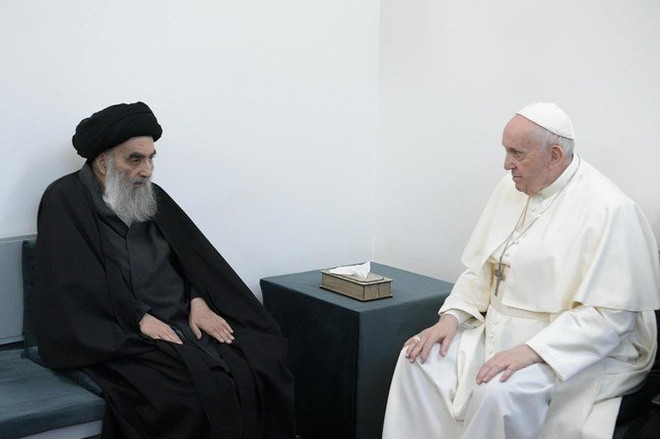Pope Francis, 84, and Shia Muslim Grand Ayatollah Ali al-Sistani, 90, spoke for nearly an hour in Iraq on March 6.
The world's two most influential religious leaders have overcome religious divisions to promote peace and unity in a historic meeting.
They met during Pope Francis’ first visit to Iraq, the pontiff’s first trip abroad since the Covid-19 pandemic began, according to the Guardian.
Shia Grand Ayatollah Ali al-Sistani "affirmed his concern that Christian citizens must live in peace and security like all Iraqis, with full constitutional rights," according to a statement.
The Pope thanked Mr Sistani for “speaking out in defence of the weakest and most persecuted” at one of the most violent times in Iraq’s modern history, the Vatican said.
 |
Pope Francis (right) and Shia Grand Ayatollah Ali al-Sistani during a historic meeting on March 6. Photo: Office of cleric Ali al-Sistani |
Neither leader wore a mask during the intimate meeting at Sistani's rented home in the holy city of Najaf amid a recent surge in Covid-19 cases in Iraq.
Pope Francis has been vaccinated against Covid-19.
The pope removed his shoes before entering Mr Sistani's room. The cleric, who usually remains seated when visitors arrive, stood as he greeted the pope at the door.
The meeting came on the second day of the pope's three-day trip, a landmark moment in modern religious history and a milestone in Pope Francis' efforts to engage in dialogue with other religions.
Pope Francis is a strong advocate of interfaith dialogue. He has met with leading Sunni clerics in several Muslim-majority countries, including Bangladesh, Morocco, Türkiye and the United Arab Emirates.
After meeting Mr Sistani, Pope Francis traveled to the ancient city of Ur, believed to be the birthplace of Abraham - the biblical patriarch revered by Christianity, Islam and Judaism.
Pope Francis then presided over a mass at St Joseph's Cathedral in Baghdad.
Iraq’s Christian population has fallen from about 1.4 million before the US-led invasion in 2003 to about 250,000 today. Christians were targeted by the Islamic State (IS) between 2014 and 2017, and the community says it continues to face discrimination and persecution.
According to Zing